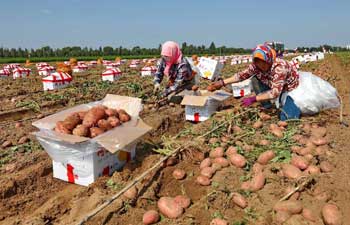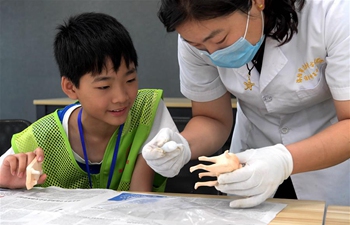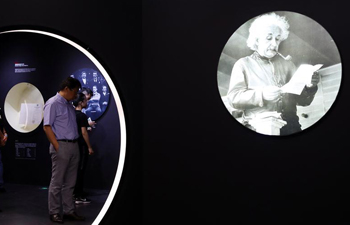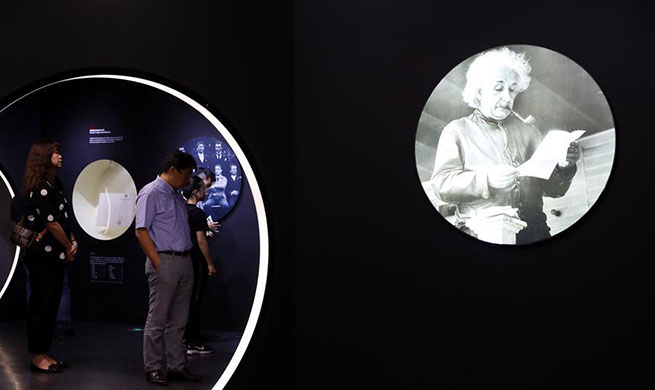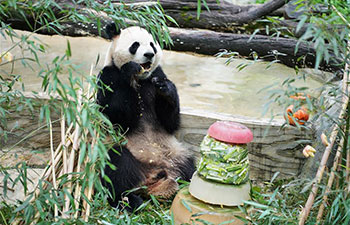TOKYO, Aug. 2 (Xinhua) -- Japan on Friday decided to remove South Korea from a list of nations entitled to simplified export control procedures, a move that has already triggered a harsh backlash from Seoul and will likely see ties further soured between both countries.
The Cabinet of Prime Minister Shinzo Abe approved plans to remove South Korea from its "white list" of countries, raising the stakes in a bitter diplomatic row between the two neighbors.
The removal of South Korea from the list will take effect on Aug. 28 following the necessary completion of domestic procedures, Japanese Minister of Economy, Trade and Industry Hiroshige Seko said at a press conference on Friday.
Seko maintained that the move by Tokyo was not aimed at curbing trade or supposed to damage bilateral ties between both countries, but did point to some perceived "deficiencies" on South Korea's part.
"Today's Cabinet decision is a review of the implementation of Japanese export policies in response to some deficiencies in South Korea's export control system and its application," Seko said.
"Japan has no intention for this to alter relations with South Korea, and it is not meant as a countermeasure against certain issues," said Japan's trade minister.
Observers have noted, however, that bilateral relations have already sunk to new lows in recent times amid an ongoing labor dispute and Japan's previous tightening of export control regulations, and the latest move by Japan would likely see ties further deteriorate.
Japan, early last month, tightened regulations on its exports to South Korea of three materials vital to producing memory chips and display panels, which are mainstays of the South Korean economy, in a further escalation of sinking ties between both parties.
Seoul has been on the white list since 2004 and has been guaranteed preferential treatment in terms of importing certain products from Japan.
But Japan's Chief Cabinet Secretary Yoshihide Suga told a separate press briefing Friday that Japan will now deal with South Korea the same way it treats other countries in the region, although maintained that global supply chains would not be affected by South Korea being axed from the white list.
"We don't believe there would be any impact on global supply chains," Japan's top government spokesman said.
Suga previously reiterated that Japan believes that it is an appropriate step from enforcing effective export controls to remove South Korea from the white list.
Japan has a total of 27 countries on its white list, including the United States, Britain, Germany, Australia, New Zealand and Argentina, and whitelisted countries can, through simplified procedures, receive products exported from Japan that could be potentially be diverted for military use.
South Korea has been on the list of nations entitled to simplified export control procedures since 2004, which cover a wide range of items, except for food, timber and other goods.
In order to export the products to countries, not on the white list, the countries listed only need to obtain approval from Japan's trade ministry.
For South Korea, however, this will no longer be the case.
Henceforth, Japanese exporters to South Korea will now be required to ask for the government's permission each time they export items that are subjected to strict controls, in contrast to previously being granted a three-year permit for sensitive items.
The tighter controls involve an about 90-day approval process and this is allegedly, from Japan's perspective, due to their high potential to be diverted for military use.
Those close to the matter said that bilateral ties now could further diminish between both sides in light of the latest move by Japan, which came amid numerous rows including Tokyo believing that Seoul has not cooperated in trying to resolve bilaterally, or by way of the establishment of an arbitration panel involving a third party, the protracted wartime labor dispute.
The Japanese side believes Seoul has missed multiple deadlines to establish an arbitration panel to settle the dispute over wartime labor.
South Korea's top court ordering some major Japanese firms to compensate South Korean plaintiffs over forced wartime labor during Japan's 1910-1945 occupation of the Korean Peninsula, with lawyers being allowed to seize the assets of some Japanese firms, initially raised the ire of the Japanese side.
Japan, for its part, has claimed the rulings are not in line with international law and run contrary to the foundation of friendly and cooperative relations between the two neighbors since the 1965 normalization of diplomatic ties.
Japan maintains the matter of compensation for wartime labor was "finally and completely" resolved under the pact.
Tokyo has claimed that Seoul has been reluctant to show a willingness to advance talks on the matter through diplomatic channels, with Seoul seemingly, from Tokyo's perspective, disregarding deadlines to name a member to an arbitration panel along with Japan and a third country and, hence, has sought outside arbitration on the issue.
In June, however, South Korea proposed that companies from both countries fund compensation for the plaintiffs, but Japan spurned the proposal for further dialogue on the matter in this direction.
The announcement of South Korea's removal from the white list, meanwhile, came a day after Japanese and South Korean foreign ministers failed to reduce tensions between the two countries in a meeting held in Bangkok, Thailand.
The South Korean government, for its part, had urged Japan not to proceed with its removal from the white list, which it estimates could have a negative bearing on more than 1,000 items in key industries spanning the auto and petrochemical sectors.
Experts close to the matter said that the measures could adversely affect both South Korean manufacturers and Japanese exporters as their supply chains are so closely connected.
Seoul on Friday was swift in condemning the move, as reported by local media here, with South Korean President Moon Jae-in describing Tokyo's decision as "extremely reckless" and calling on Japan to reverse its decision as soon as possible or incur significant "damage" for Japan's "economic retaliation" over the wartime dispute.
As ties between the two neighbors look set to further unravel, U.S. Secretary of State Mike Pompeo had said he hoped to mediate the situation between both parties and assist in helping them "find a way to move forward together."
Moon, however, was quoted as saying on Friday afternoon that Japan had rebuffed the U.S. proposal to help mediate a situation that is quickly threatening to deteriorate further.
